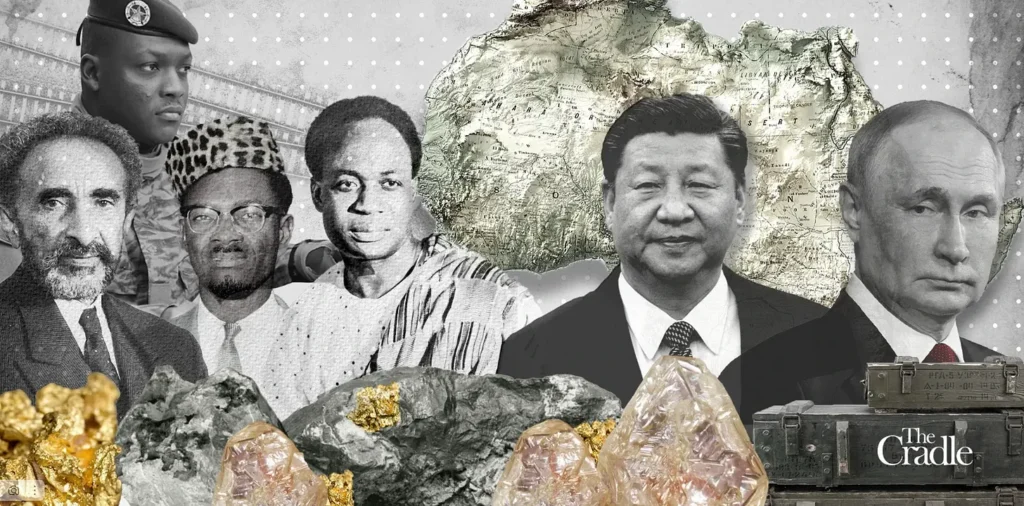The West Destroyed Africa, Eurasia Will Revive It
TRANSCEND MEMBERS, 25 Sep 2023
Matthew Ehret Insights – TRANSCEND Media Service
20 Sep 2023 – In Africa, injustice looms large, marked by poverty, warfare, and famine. Despite post-WWII political gains, economic independence, a vital component of true freedom as envisioned by Pan African leaders like Kwame Nkrumah, Patrice Lumumba, and Haile Selassie, remains elusive.
After decades of restrictive IMF and World Bank loans, poverty, hunger, and conflict persist throughout the continent. While many attribute this to Africa’s governance challenges, in reality, a deliberate imperial agenda has hindered the continent’s development in all political, economic, and security sectors.
Coups against neo-colonialism
But much has changed in the past few years. The growing clout of Eurasian institutions that fully embrace Global South countries as valuable, integral, and equal members – the BRICS+ and Greater Eurasian Partnership are examples – offer hope that old neo-colonial shackles will be broken and that Africa can enjoy an unfettered renaissance.
The rise of a new global pole to challenge the old unipolar order has had a notable impact across sub-Saharan West Africa which, in recent years, has seen a surge in military coups shifting power away from regimes that had long prioritized the interests of western corporations.
These coups occurred in Chad (April 2021), Mali (May 2021), Guinea (September 2021), Sudan (October 2021), Burkina Faso (January 2022), Niger (July 2023), and Gabon (August 2023) – all resource-rich countries with abnormally poor living conditions.
In Gabon, over 30 percent of its people live on less than $1 per day, while 60 percent of its regions have no healthcare or clean drinking water despite the abundance of gold, diamonds, manganese, uranium, iron ore, natural gas, and oil – mostly monopolized by French corporations like Eramat, Total and Ariva.
Despite its abundance of rare earths, copper, uranium, and Gold, 70 percent of Malians still live in abject poverty. SImilarly, Sudan, with its riches in oil, fertile soil, and water, has 77 percent of the population living below the poverty line.
In uranium-rich Niger, which provides over 35 percent of the fuel for France’s nuclear industry (accounting for 70 percent of France’s energy basket), mainly under the control of France’s Orano, only 3 percent of Nigerians have access to electricity. In the “former” French colony of Chad, that number is only a little higher at 9 percent, and a still-unacceptable 20 percent in Burkina Faso.
While Altanticists desperately seek ways to keep their talons embedded into the African continent and its abundant riches, a much healthier security paradigm has emerged in recent years from Eurasia.
A new security paradigm for Africa and the world
Since the 2021 coup in Mali, Russian military support has skyrocketed, with the supply of numerous fighter jets and Turkish drones, accompanied by Russian military advisors who have provided substantial assistance to the state.
This approach mirrors Moscow’s strategy in other conflict-ridden countries, such as Syria, where the focus is on eradicating terrorism and supporting legitimate governments.
In 2022, following local accusations that French troops were supporting the Al-Qaeda-affiliated terrorists they claimed to be fighting, 400 Russian military personnel were deployed to Boko Haram-infested Mali. This move marked a significant shift in the region’s security dynamics.
Despite the extensive presence of US and French military bases across Africa and the substantial financial investments in “counter-terrorism” efforts on the continent, militant violence has continued to escalate dramatically, with sub-Saharan Africa witnessing an 8 percent increase in terrorism over the previous year.
Last year, sub-Saharan Africa accounted for 60 percent of all terror-related deaths. A 2021 African Center for Strategic Studies report shows that 18,000 conflicts affected sub-Saharan states resulting in over 32 million displaced persons and refugees.
To read full text Go to Original – matthewehret.substack.com
____________________________________________
 Matthew Ehret is a member of the TRANSCEND Network for Peace Development Environment, a journalist, and co-founder of the Rising Tide Foundation. He is the Editor-in-Chief of Canadian Patriot Review, Senior Fellow at the American University of Moscow and host of The Great Game on Rogue News. He has authored the book series The Untold History of Canada and the recently published book series The Clash of the Two Americas. Email: matt.ehret@tutamail.com
Matthew Ehret is a member of the TRANSCEND Network for Peace Development Environment, a journalist, and co-founder of the Rising Tide Foundation. He is the Editor-in-Chief of Canadian Patriot Review, Senior Fellow at the American University of Moscow and host of The Great Game on Rogue News. He has authored the book series The Untold History of Canada and the recently published book series The Clash of the Two Americas. Email: matt.ehret@tutamail.com
Tags: Africa, Anti-hegemony, Anti-imperialism, Asia, Eurasia, European Union, Hegemony, Imperialism, US empire
DISCLAIMER: The statements, views and opinions expressed in pieces republished here are solely those of the authors and do not necessarily represent those of TMS. In accordance with title 17 U.S.C. section 107, this material is distributed without profit to those who have expressed a prior interest in receiving the included information for research and educational purposes. TMS has no affiliation whatsoever with the originator of this article nor is TMS endorsed or sponsored by the originator. “GO TO ORIGINAL” links are provided as a convenience to our readers and allow for verification of authenticity. However, as originating pages are often updated by their originating host sites, the versions posted may not match the versions our readers view when clicking the “GO TO ORIGINAL” links. This site contains copyrighted material the use of which has not always been specifically authorized by the copyright owner. We are making such material available in our efforts to advance understanding of environmental, political, human rights, economic, democracy, scientific, and social justice issues, etc. We believe this constitutes a ‘fair use’ of any such copyrighted material as provided for in section 107 of the US Copyright Law. In accordance with Title 17 U.S.C. Section 107, the material on this site is distributed without profit to those who have expressed a prior interest in receiving the included information for research and educational purposes. For more information go to: http://www.law.cornell.edu/uscode/17/107.shtml. If you wish to use copyrighted material from this site for purposes of your own that go beyond ‘fair use’, you must obtain permission from the copyright owner.
